|

HOME |
ABOUT | INDEX |
NEWS |
FACEBOOK |
CONTACT
PRONOUNS
Preferred Gender Pronouns
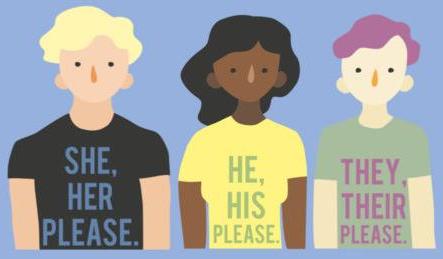

Allies and Advocates
Respectful Language
Attitude and Self Reflection
Homophobia|Heterosexism
Cisnormative
Deadnaming and Misgendering

Preferred Gender Pronouns
In general, a pronoun is a word that refers to either
the people talking (I, me, you) or someone or
something that is being talked about (he, she, it,
them, this). Gender pronouns (he, him, his, she, her, hers,
them, their)
specifically refer to people that you are talking about.
Traditionally, these gender pronouns are matched with
people accordingly: Men/males are referred to by
"he/him/his" and women/females are referred to by
"she/her/hers." Sometimes, however, a person whose
gender is fluid may prefer an opposite pronoun. In
such cases a man/male may prefer "she/her/hers" and a
woman/female may prefer "he/him/his." These are
called preferred gender pronouns (PGP).
Some
people may choose to use pronouns that are neither
masculine or feminine. In such cases a person may
prefer the singular they by using "them/they/their." Or they may prefer "ze/zem/zir."
These are called gender neutral pronouns (or gender inclusive pronouns).
They
are used to show respect to individuals and groups whose
gender identity is non-binary, non-conforming, or fluid.


A preferred gender pronoun (PGP) is the pronoun
that a person considers to be the correct pronoun
and chooses to use for himself/herself/themself. For example:
If Linda's preferred pronouns are she/her/hers,
you could say "Linda ate her food because she was
hungry." Or if Linda's preferred pronouns are
them/they/their, you could say "Linda ate their food
because they was hungry."
"She, her, hers" and "he, him, his" are the most commonly
used pronouns. Some people call these female/feminine
and male/masculine pronouns. But many avoid these
labels because, for example, not everyone who uses "he"
feels like a male or masculine.
And not everyone who uses "she" feels like a female or
feminine.
White House Stance On Pronouns Isn't Just
Childish — It's Also Legally Fraught
Guide to Practicing Gender-Neutral Pronouns for
Well-Meaning Cis Friends and Family
It Feels Very Positive:
Eddie Izzard Now Using She/Her Pronouns
Info: Gender Expression
NY Times: What's In a Gender Pronoun?
Oxford
Dictionary: Brief
History of Singular They
Info: Respectful
Language
Simple Animation
Explanation: Using
They/Them Pronouns
Video: Discussing
Pronouns
Washington Post: The Pronoun They
Gender Pronoun Resources
Info: Transgender
Pronoun Guide: Support Your Trans Friends
My Pronouns: Pronouns
Matter

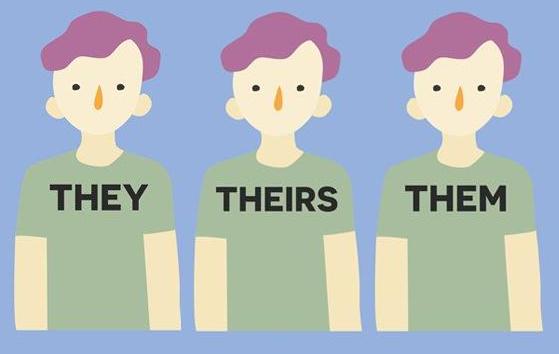
Gender Neutral
Pronouns
A
gender-neutral pronoun or gender-inclusive pronoun is
one that gives no implications about gender, and could
be used for someone of any gender. People with
non-binary gender identities often choose new or unique
third-person pronouns for themselves as part of their
transition. They often choose gender-neutral pronouns so
that others won't see them as female or male. For
example, you can use the plural pronouns "them/they/their"
as singular pronouns. Or you can use the neopronouns "ze/zem/zir."
For people who identify as transgender, style guides and
associations of journalists and health professionals
advise use of the pronoun preferred or considered
appropriate by the person in question. When dealing with
clients or patients, health practitioners are advised to
take note of the pronouns used by the individuals
themselves, which may involve using different pronouns
at different times. This is also extended to the name
preferred by the person concerned. LGBTQ advocacy groups
also advise using the pronouns and names preferred or
considered appropriate by the person concerned.
 
Guide to Using Gender Neutral Pronouns
Ash Hardell Video: All About Pronouns
Gay Straight Alliance for Safe Schools:
Preferred Gender Pronouns
Gender Neutral Pronouns: They/Them
Being a Trans Ally: Preferred Gender Pronouns
Info: Deadnaming
Gender Neutral Pronouns: They're Here,
Get Used to It
Respecting They Pronouns
Why is it
important to respect people's PGPs? You can't always
know what someone’s PGP is by looking at them. Asking
and correctly using someone's preferred pronoun is one
of the most basic ways to show your respect for their
gender identity. When someone is referred to with the
wrong pronoun, it can make them feel disrespected,
invalidated, dismissed, alienated, or dysphoric. It is a
privilege to not have to worry about which pronoun
someone is going to use for you based on how they
perceive your gender. If you have this privilege, yet
fail to respect someone else's gender identity, it is
not only disrespectful and hurtful, but also oppressive.
However,
there are some LGBTQ people who are indifferent about
the use of preferred gender pronouns. Among famous queer
celebrities who do not consider pronouns an issue are
RuPaul and Boy George.
RuPaul stated: "You can call me he. You can call me she.
You can call me Regis and Kathie Lee. I don't care. Just
as long as you call me." And Boy George said, "Leave
your pronouns at the door. Pronouns are a modern form of
attention-seeking."

Gender Neutral Pronouns: They're Here,
Get Used to It
My Pronouns:
Pronouns Matter
Guide to Practicing Gender-Neutral Pronouns for
Well-Meaning Cis Friends and Family
Video Chat: How to Use They/Them Pronouns
Boy George: Pronouns are for Attention-Seekers
Gender-Neutral Pronouns 101: Everything
You've Always Wanted to Know
NY Times: What's In a Gender Pronoun?
Guide to Gender-Inclusive Language
Everything You Need to Know About
Neopronouns
Non-Binary Pronouns
Teen Vogue: All Your
Questions About Gender Neutral Pronouns Answered
Video: Why Pronouns are Important
Wikipedia: Gender Pronouns
Info: Respectful Language

The use of gender neutral pronouns typically involves
the replacement of gender-specific pronouns (he, she,
him, her, his, her) with pronouns that are more generic
or inclusive. You might use they/them/their as singular
pronouns, which is a very popular option. While there are many variations in use,
here are popular examples of neopronouns:
He/She - Ze or Zie (pronounced Zee)
Him/Her - Zem or Zim (pronounced Zem
or Zim)
His/Hers - Zirs (pronounced Zeers)
Ze and Zem are popular alternate pronouns that are
gender neutral and preferred by some transgender people.
"Ze" replaces “he” and “she." "Zem" replaces “him” and “her."
Alternatively, some people
who are not comfortable with and do not embrace he/she
pronouns, may use the plural pronoun “they/their” as a
gender neutral singular pronoun.
Mx. is an
alternate title for Mr., Miss, Mrs., or Ms. that is
gender neutral and preferred by some transgender people.
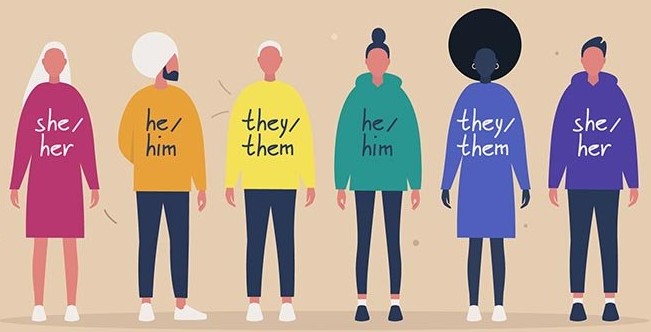
LGBTQ Resource Center: Gender Pronouns
Preferred Gender Pronouns: Guide for Faculty, Staff, and
Allies
Video: Why Pronouns are Important
Guide to Using Gender Neutral Pronouns
Guide to Practicing Gender-Neutral
Pronouns for Well-Meaning Cis Friends
and Family
Washington Post: The Pronoun They
Gender Pronoun Resources
Oxford Dictionary: Brief History of
Singular They
Gender Neutral Terms We Should Be Using
Info: Gender Queer
God Updates Mankind on Pronoun Usage
Here is a
summary of pronouns, including gender-specific pronouns,
they singular pronouns, and neopronouns:
|
She |
Her |
Hers |
Herself |
|
He |
Him |
His |
Himself |
|
They |
Them |
Their |
Themself |
|
Xe |
Xem/Xim |
Xirs/Xyrs |
Xirself |
|
Ze |
Zem/Zim |
Zirs/Zyrs |
Zirself |
|
Ey |
Em |
Eirs |
Eirself/Emself |
|
Per |
Per |
Pers |
Perself |
|
Hu |
Hum |
Hus/Hums |
Humself |
 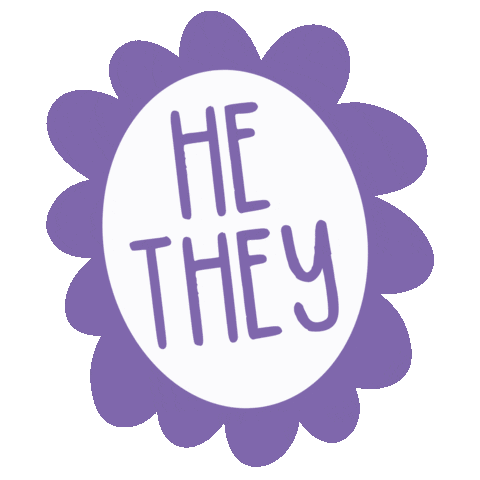
Guide to Using Gender Neutral Pronouns
Gay Straight Alliance for Safe Schools:
Preferred Gender Pronouns
My Pronouns: Pronouns
Matter
Gender-Neutral Pronouns 101: Everything
You've Always Wanted to Know
Everything You Need to Know About
Neopronouns
Video: Singular They
Being a Trans Ally: Preferred Gender Pronouns
Info: Deadnaming
Gender Neutral Pronouns: They're Here,
Get Used to It
NY Times: What's In a Gender Pronoun?
Instead
of "Hey Guys!" Try These
Gender-Neutral
Alternatives
Gender Neutral
Communication
Video: Discussing
Pronouns
Simple Animation Explanation: Using They/Them Pronouns
Info: Gender Expression

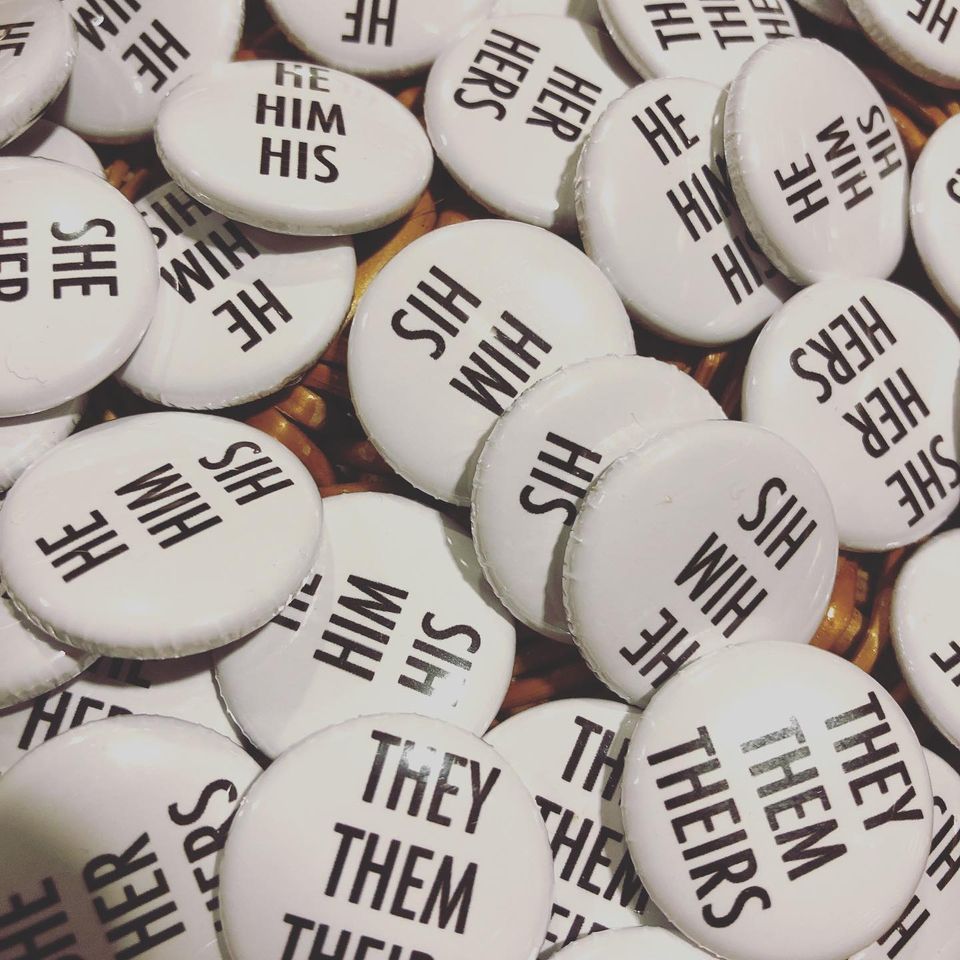
Pronouns
and More
It should be noted that the use of preferred gender
pronouns is just part of the overall effort to show
respect to transgender and gender non-conforming people
through the use of language.
Using
pronouns in conversation is typically a matter of
talking ABOUT (making a reference to) a transgender or
gender non-conforming person. While the
transgender or gender non-conforming person may be
within earshot of the conversation, generally they are
not present.
There are
other language considerations that might arise when the
situation is a matter of talking TO or WITH (personally
addressing) a transgender or gender non-conforming
person. In such circumstances, when the transgender or
gender non-conforming person is part of the interaction,
one should be aware of any number of words, terms, and
phrases that communicate an understanding of specific gender...
Sir/Ma'am... Guy/Gal... Man/Woman... Boy/Girl... Gentleman/Lady...
Dad/Mom... Bro/Sis...
Guide to Using Gender Neutral Pronouns
US House of Reps Adopts
Gender Neutral Language Rules
The Problem
With "Hey Guys"
Video: Singular They
Oxford Dictionary: Brief History of
Singular They
Guide to Practicing Gender-Neutral Pronouns for
Well-Meaning Cis Friends and Family
Kat Blaque Video: Why Pronouns are Important
Everything You Need to Know About
Neopronouns
Gender Neutral Pronouns: They're Here,
Get Used to It
Video Chat: How to Use They/Them Pronouns
Guide to Gender-Inclusive Language

Gender Neutral
Terms
Oftentimes, it is best to use gender-neutral terms instead of
gender-specific terms. There are plenty of
reasonable alternatives you can use that make no
reference to gender... Clerk... Staff... Crew...
Team... Member... Colleague... Co-Worker... Assistant... Associate... Persons...
Friends... Pals... People... Peeps...
Everyone...
"Folks" is
a handy gender-neutral term. It is sometimes
rendered as "Folx."
Even
innocent-sounding, well-intentioned greetings, like "Hey
guys," can be insensitive. You might just drop the
"guys" and simply say "hey," "hello," or "hi."
Other alternative gender-neutral options might
include... Hey All... You All... Y'all...
You can
experiment with phrases that are comfortable to you as
you rehearse such salutations as... Hello Everyone...
Hey Folks... Hello, my Dear Colleagues... Hey Friends...
Hello You All... Greetings...
Washington Post: The Pronoun They
They/Them Pronoun Tips
It Feels Very Positive:
Eddie Izzard Now Using She/Her Pronouns
Language of Gender
Gender Neutral Pronouns: They/Them
Pronoun Guide: Support Your Trans Friends
Gender Pronoun Resources
Info: Transgender
The Problem
With "Hey Guys"
Kat Blaque Video: Why Pronouns are Important
Person/Individual (Instead of Man)
People
(Instead of Men)
Humankind/Humanity
(Instead of Mankind)
Partner/Significant Other (Instead of Boyfriend,
Girlfriend)
Spouse/Partner (Instead of Husband, Wife)
First-Year
Student (Instead of Freshman)
Artificial/Synthetic (Instead of Man-Made)
Face-to-Face (Instead of Man-to-Man)
Parent
(Instead of Mother, Father)
Sibling
(Instead of Brother, Sister)
Child
(Instead of Son, Daughter)
Chair
(Instead of Chairman)
Police
Officer (Instead of Policeman)
Firefighter (Instead of Fireman)
Kat Blaque Video: Why
Pronouns are Important
My Pronouns: Pronouns
Matter
New Survey: 25% of LGBTQ
Youth Use Non-Binary
Pronouns
LGBTQ Resource
Center: Gender Pronouns
Preferred Gender
Pronouns: Guide for
Faculty, Staff, and
Allies
Gender Neutral Pronoun
Blog
Gender Neutral Terms We
Should Be Using
It Feels Very Positive:
Eddie Izzard Now Using
She/Her Pronouns
Video: Discussing
Pronouns
Use of Preferred Gender
Pronouns Expands Trans
Acceptance
Info: Deadnaming
Actor
(Instead of Actress)
Flight
Attendant (Instead of Stewardess)
Sales
Representative/Rep/Associate (Instead of Salesman)
Mail
Carrier (Instead of Mailman)
Server
(Instead of Waitress)
Spokesperson (Instead of Spokesman)
Workers
(Instead of Workmen, Men at Work)
Anchor
(Instead of Anchorman)
Business
Person/Professional (Instead of Businessman)
Legislator/Representative (Instead of Congressman)
Council
Member (Instead of Councilman)
Soldiers/Sailors/Pilots (Instead of Men & Women of the
Military)
Founder
(Instead of Founding Father)
Tailor
(Instead of Seamstress)
Artisan
(Instead of Craftsman)
Cave
Dweller (Instead of Caveman)
NY Times: What's In a Gender Pronoun?
It Feels Very Positive:
Eddie Izzard Now Using
She/Her Pronouns
Respecting They Pronouns
Gender Neutral
Communication
Instead
of "Hey Guys!" Try These
Gender-Neutral
Alternatives
Video: Discussing
Pronouns
My Pronouns:
Pronouns Matter
Gender Neutral Word List
Washington Post: The Pronoun They
Gender-Neutral Pronouns 101: Everything
You've Always Wanted to Know
Gender Neutral Terms We Should Be Using
God Updates Mankind on Pronoun Usage
Non-Binary Pronouns
Language of Gender
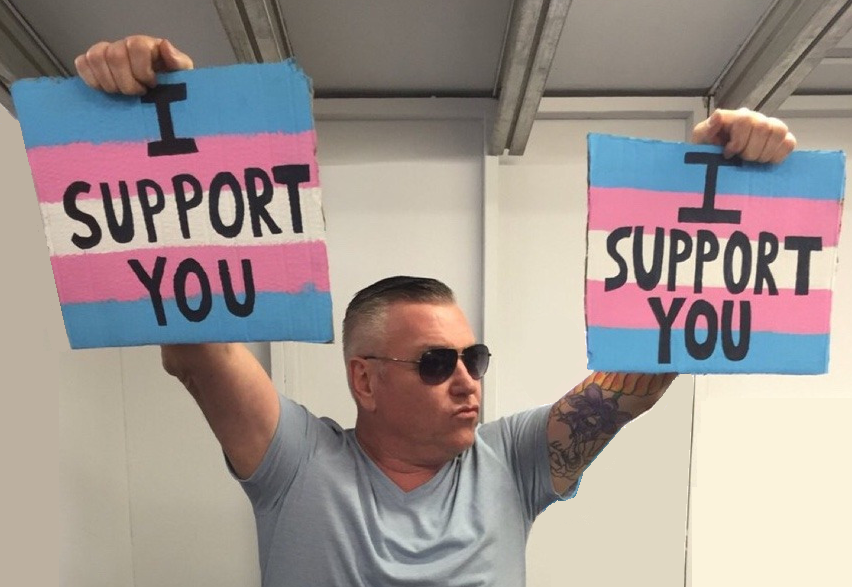
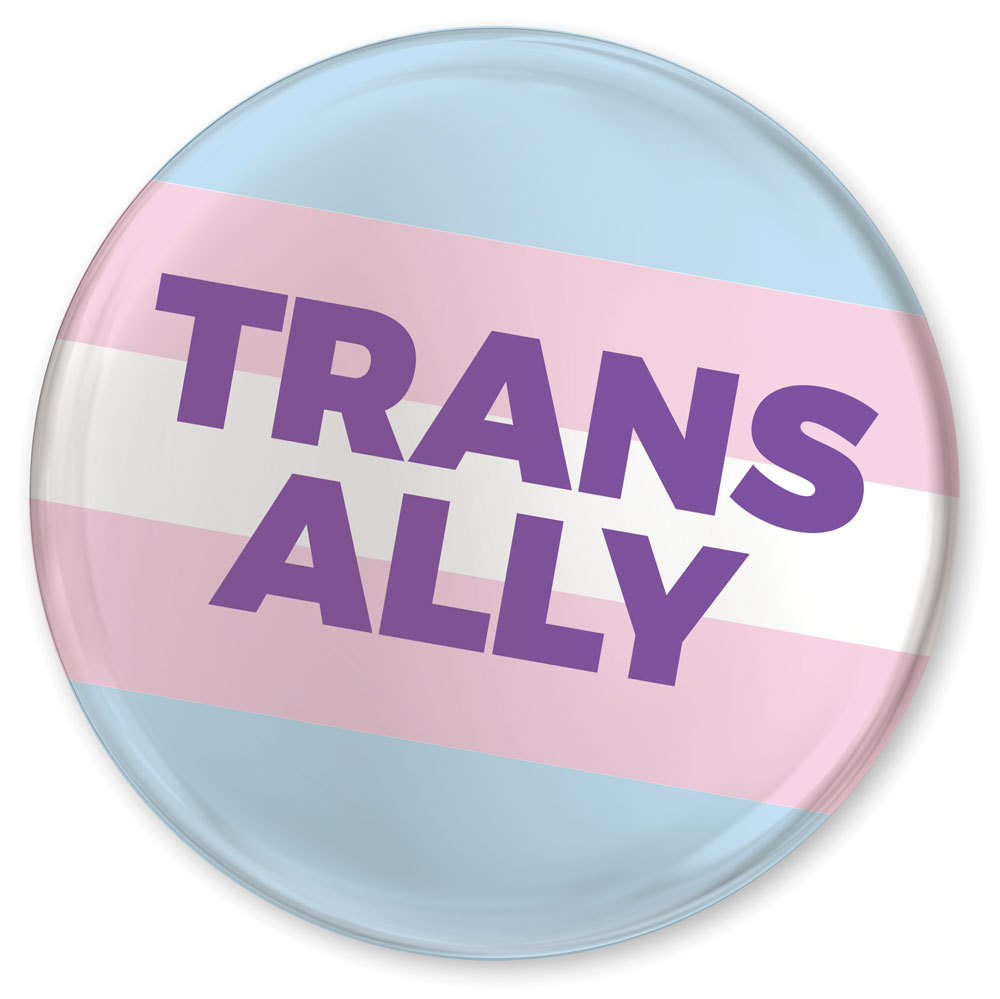
Reciprocity and Understanding
We expect that cis/straight
allies are sincere in their effort to extend respect and
affirmation to transgender and genderqueer people. We
expect that they understand why it is important to use
the proper pronouns and the proper name when referring
to or interacting with a transgender or genderqueer
person. We expect that they are aware of the harm that
can be done when someone deadnames a trans person or
uses the wrong pronouns. And we expect that they
are trying their best to do the right thing on behalf of
transgender and genderqueer people.
In the
spirit of reciprocity, we also expect that transgender
and genderqueer people will extend the same courtesy and
respect to cis/straight allies. We expect that
transgender and genderqueer people will be patient and
understanding of mistakes and mis-steps made by cis/straight
allies. We expect that they are aware that cis/straight
allies, while sincere in the effort to offer support and
affirmation, are not perfect and that they will
sometimes make mistakes. We expect that
transgender and genderqueer people understand that such
errors by cis/straight allies are unintentional and
accidental.
Please
remember, cis/straight allies are friends of the LGBTQ
community. They are not hostile, mean-spirited,
judgmental, or callous, but, in fact, seek to be
respectful, empathetic, and supportive regarding LGBTQ
people. They are not ignorant or uniformed, but, in
fact, are very educated regarding LGBTQ issues and
concerns. But they are also human, they are flawed, and
they are not perfect. Cut them some slack. They do not
need to be regarded in the same light as those who
purposefully, intentionally, and with conscious malice,
cause distress to LGBTQ people. Such anti-LGBTQ people
are ignorant and hateful and typically hold unhealthy
attitudes and dangerous beliefs regarding LGBTQ people.
How to be a Trans Ally
Basic Trans Ally Manners
Info: LGBTQ Straight Allies
Cis and Flawed: Being a Good Trans Ally
They/Them Pronoun Tips
Being a Trans Ally
Info: Deadnaming
My Pronouns: Pronouns
Matter
Try Not to Be
Overly Sensitive
A
little patience and grace can go a long way....
Maybe we
should all try to be a little more patient with people
who are doing their best to get it right. It serves no
good purpose for trans and non-binary folks to be overly
sensitive to allies who simply made an honest and
innocent mistake.
One
straight ally remarked, "It sometimes seems like it's
never enough. Even when I use the right pronouns,
someone finds a reason to be offended."


For LGBTQ-friendly folks (both gay and straight) who
work with the public (retail setting, restaurant
setting), there should be some recognition for their
sincere efforts. One retailer shared this insight:
"I respect
everyone's pronouns, but I'm exhausted by people who
twist harmless expressions into personal attacks. Had a
non-binary client the other day, and I made sure to use
they/them pronouns the whole session - same respect I
show every client.
Everything was going great until I said gurll, that's
crazy in response to something wild they told me.
It's just how I talk, you know? I use that phrase with
literally everyone. It's expressive slang, not gendered.
They immediately stopped, gave me this look, and said
Don't call me a girl. The disgust in their tone was
intense and honestly killed the whole vibe instantly. I
apologized right away and explained it was just an
expression, not calling them anything. They accepted it
and we moved forward.
Look, I get it. Everyone deserves respect, and I
genuinely try to be mindful. But I'm tired of how
quickly things escalate over stuff that clearly has zero
harmful intent behind it.
I'm gay and respect matters to me. But it feels like no
matter how careful I am, someone's always ready to find
offense in something completely harmless."


Another
person shared this story...
"After going through the checkout at the grocery store,
and a little chit-chat while the clerk was ringing
everything up, at the last I said, "Thank you sir!" and
he/she exploded It's MA-AM! How the hell was I
supposed to know? He looked like, dressed like and had a
voice like a man. I thought I was being polite and
grateful - that's how I was raised - and so I had no
idea that saying Thank you was offensive. So from
now on, I'll just leave out the sir and ma-am
part."
And yet another comment...
"I am very
careful with pronouns as well, but if someone says
something a little shocking I just instantly Dude!
without thinking about it, to anyone, regardless of
gender. I'm Gen X, it's still a thing for me 40 years
later, what can I say. And I've had some great ladies
get VERY mad at me for it."
My Pronouns: Pronouns
Matter
Gender Neutral Pronouns:
My Personal Pep Talk
Comic Eddie Izzard: Now
Using She/Her Pronouns
Struggles You Face When Your Pronouns Are They/Them
Halsey: Using Pronouns
That Feel Most Authentic to Them
US House of Reps Adopts
Gender Neutral Language Rules
Guide to Gender-Inclusive Language
Pronouns,
Inclusivity, Respect
Candace Gingrich, HRC's Associate Director of Youth &
Campus Engagement, says that "using preferred gender
pronouns is less about extending courtesy than of
practicing basic human dignity."
If you are part of an LGBTQ support group or a
gay-straight student alliance, one way to make sure that
you are being inclusive and welcoming for transgender or
other gender nonconforming people is to incorporate PGPs
into your regular intro activities. If you start every
meeting by having those present share their names, ask
them to share their PGPs as well.
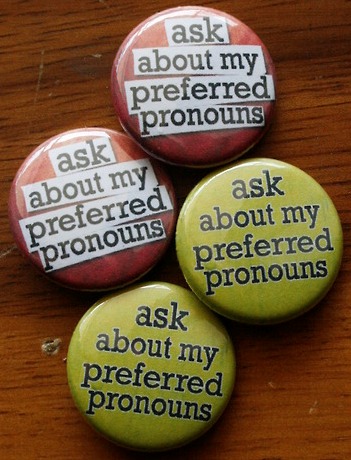
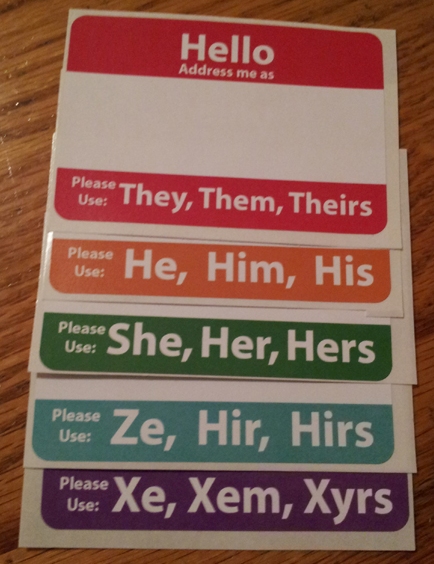

Gender Neutral Pronouns:
My Personal Pep Talk
LGBTQ Resource
Center: Gender Pronouns
Preferred Gender
Pronouns: Guide for
Faculty, Staff, and
Allies
God Updates Mankind on Pronoun Usage
Kat Blaque Video: Why Pronouns are Important
Pronoun Guide: Support Your Trans Friends
Guide to Practicing Gender-Neutral Pronouns for
Well-Meaning Cis Friends and Family
They/Them Pronoun Tips
Guide to Gender-Inclusive Language
Oxford Dictionary: Brief History of
Singular They
Info: Gender Expression
For example:
My name
is Jasmine, I’m a sophomore, and my PGPs are ‘she’ and
‘her’
Hi, I’m
Diego, I’m 17, a senior, and my preferred gender
pronouns are ‘he’, ‘him’, and ‘his’
In social interactions, simple questions, like these,
will communicate respect and acceptance:
What pronouns do you use?
How would you like me to refer to you?
How would you like to be addressed?
Can you remind me which pronouns you like for yourself?
My name is Tom and my pronouns are he and him. What
about you?
Buttons and stickers are useful tools for groups to use.
Name tags (the peel and stick kind) can be utilized at
conferences, meetings, and social events to clarify
pronouns.
Hello My Name is..... My Preferred Pronouns
are....

My Pronouns: Pronouns
Matter
Gender Neutral Pronouns:
My Personal Pep Talk
Comic Eddie Izzard: Now
Using She/Her Pronouns
Struggles You Face When Your Pronouns Are They/Them
Halsey: Using Pronouns
That Feel Most Authentic to Them
US House of Reps Adopts
Gender Neutral Language Rules
Guide to Gender-Inclusive Language
In some organizations and offices, staff members may
incorporate their PGPs in the signature block of their
e-mail messages, as in this example:
Sally Smith
Director of Counseling Services
University of Anywhere
123 Main Street, Anywhere USA 12345
555-1212 / smith@email.com
Pronouns: She/Her/Hers
A note like this one could be included in the footer of
an e-mail or business correspondence: "Self-expression
and self-identification are among my professional and
personal values. One way to practice these values is to
share preferred gender pronouns. My name is Samuel and I
use she/her pronouns. What pronouns do you use?"
Some people prefer that you use gender neutral or gender
inclusive pronouns when talking to or about them. In
English, the most commonly used singular gender neutral
pronouns are ze (sometimes spelled zie) and hir. “Ze” is
the subject pronoun and is pronounced zee, and “hir” is
the object and possessive pronoun and is pronounced heer.
This is how they are used: “Chris is the tallest person
in class, and ze is also the fastest runner.” “Sarah is
going to Hawaii over spring break with hir parents. I’m
so jealous of hir.”
Simple Animation
Explanation: Using
They/Them Pronouns
Gender Neutral Pronoun
Blog
Boy George: Pronouns are
for Attention-Seekers
Video Chat: How to Use
They/Them Pronouns
My Pronouns: Pronouns
Matter
Everything You Need to
Know About Neopronouns
Non-Binary Pronouns
Gender Neutral Terms We
Should Be Using
Video: Discussing
Pronouns
Use of Preferred Gender
Pronouns Expands Trans
Acceptance
Info: Deadnaming
The Problem
With "Hey Guys"
Teen Vogue: All Your
Questions About Gender Neutral Pronouns Answered
Video: Why Pronouns are Important
HOME
QUEER CAFE
│ LGBTQ Information Network │ Established 2017 |